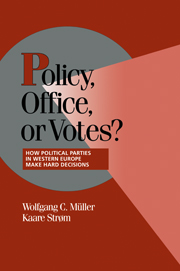Book contents
- Frontmatter
- Contents
- Figures
- Tables
- Contributors
- Chapter 1 Political Parties and Hard Choices
- Chapter 2 Office, Votes, and Then Policy: Hard Choices for Political Parties in the Republic of Ireland, 1981–1992
- Chapter 3 Party Behaviour and the Formation of Minority Coalition Governments: Danish Experiences from the 1970s and 1980s
- Chapter 4 From Policy-Seeking to Office-Seeking: The Metamorphosis of the Spanish Socialist Workers Party
- Chapter 5 Changing Strategies: The Dilemma of the Dutch Labour Party
- Chapter 6 Party Behavior in a Polarized System: The Italian Communist Party and the Historic Compromise
- Chapter 7 Decision for Opposition: The Austrian Socialist Party's Abandonment of Government Participation in 1966
- Chapter 8 Leadership Accountability and Bargaining Failure in Norway: The Presthus Debacle
- Chapter 9 Winner Takes All: The FDP in 1982–1983: Maximizing Votes, Office, and Policy?
- Chapter 10 Trade-offs in Swedish Constitutional Design: The Monarchy under Challenge
- Chapter 11 Parliamentary Rules and Party Behavior during Minority Government in France
- Chapter 12 Conclusions: Party Behavior and Representative Democracy
- Index
- Titles in the series
Chapter 4 - From Policy-Seeking to Office-Seeking: The Metamorphosis of the Spanish Socialist Workers Party
Published online by Cambridge University Press: 05 May 2010
- Frontmatter
- Contents
- Figures
- Tables
- Contributors
- Chapter 1 Political Parties and Hard Choices
- Chapter 2 Office, Votes, and Then Policy: Hard Choices for Political Parties in the Republic of Ireland, 1981–1992
- Chapter 3 Party Behaviour and the Formation of Minority Coalition Governments: Danish Experiences from the 1970s and 1980s
- Chapter 4 From Policy-Seeking to Office-Seeking: The Metamorphosis of the Spanish Socialist Workers Party
- Chapter 5 Changing Strategies: The Dilemma of the Dutch Labour Party
- Chapter 6 Party Behavior in a Polarized System: The Italian Communist Party and the Historic Compromise
- Chapter 7 Decision for Opposition: The Austrian Socialist Party's Abandonment of Government Participation in 1966
- Chapter 8 Leadership Accountability and Bargaining Failure in Norway: The Presthus Debacle
- Chapter 9 Winner Takes All: The FDP in 1982–1983: Maximizing Votes, Office, and Policy?
- Chapter 10 Trade-offs in Swedish Constitutional Design: The Monarchy under Challenge
- Chapter 11 Parliamentary Rules and Party Behavior during Minority Government in France
- Chapter 12 Conclusions: Party Behavior and Representative Democracy
- Index
- Titles in the series
Summary
INTRODUCTION
From being a party of militants, who in theory at least were expected to be disciplined, thoroughly committed, active, and schooled in the theory and practice of socialism, the PSOE went a long way towards an alternative electoralist model in which the role of the militant was relegated and party leaders sought direct communication with an electoral clientele by means of mass media and marketing techniques.
GILLESPIE (1989a: 300)This chapter attempts to explain the Spanish Socialist Worker's Party's (PSOE) rapid shift from a policy-seeking party (as late as 1978) to an office-seeking party (by 1982). The PSOE emerged from the transition to democracy as a classic policy-seeking party: Its radical agenda was aimed more at party activists than at the electorate. After a loss in the 1979 general elections, the party moderated its image to enhance its electability, thus becoming more of a vote-seeking party. This strategy paid off in the 1982 elections, but the party entered government with some vestiges of a policy-seeking party. The Socialist leadership quickly eliminated these traits after the 1982 elections, and the PSOE subsequently became a largely office-seeking party. A new emphasis on economic modernization, efficient administration, and the desire to create “Things Well Done” (the PSOE campaign theme for the June 1987 elections) replaced the old concern for equality and participatory democracy (autogestión). The PSOE adopted a new image, based on its technocratic-administrative capability and the charisma of its leader, Felipe González, and it rapidly shed its social democratic skin.
- Type
- Chapter
- Information
- Policy, Office, or Votes?How Political Parties in Western Europe Make Hard Decisions, pp. 89 - 111Publisher: Cambridge University PressPrint publication year: 1999
- 7
- Cited by

